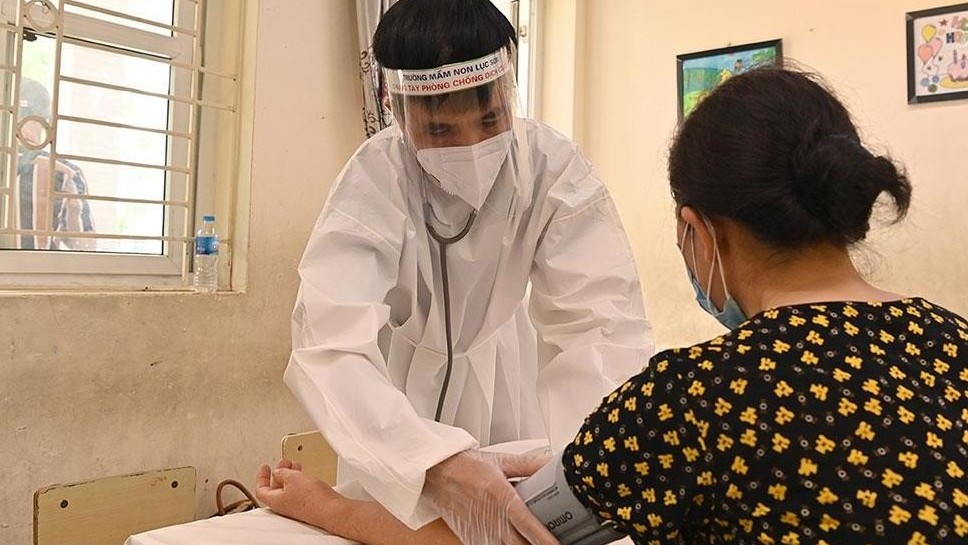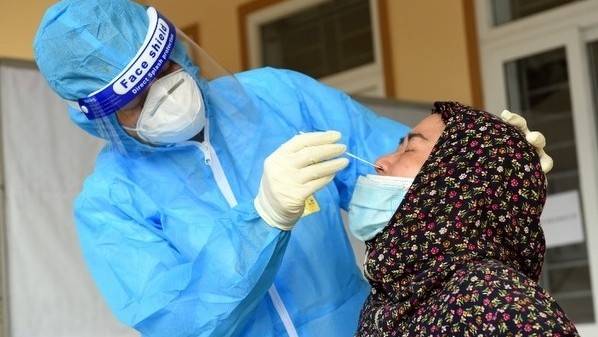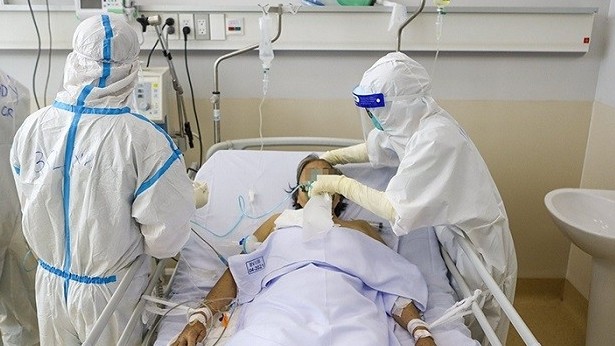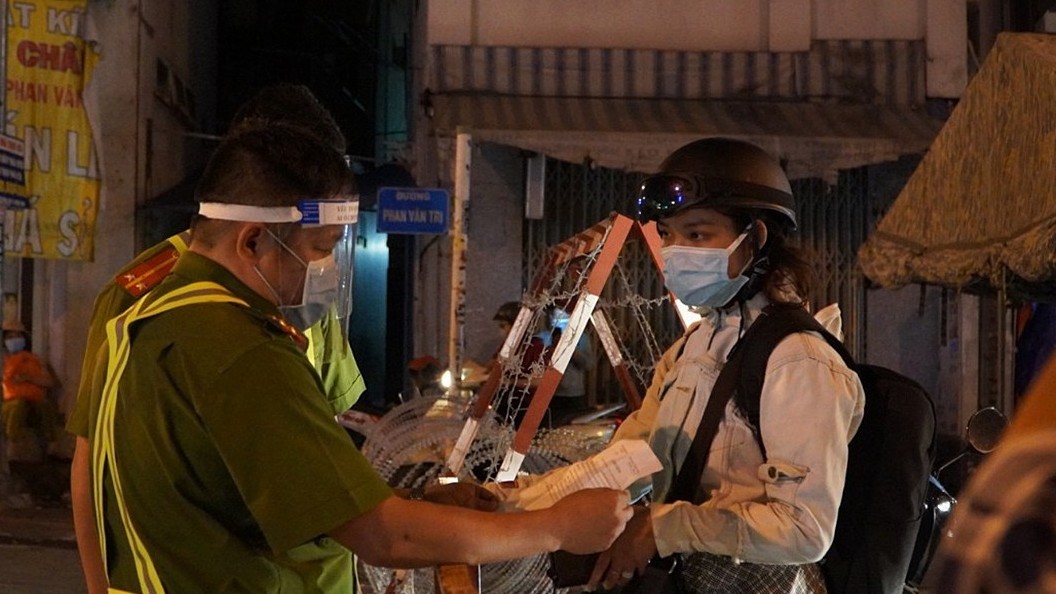Vietnamese seniors embrace nursing home life
Opening the window, Vu Thi Danh, 83, tries to entice the morning breeze into the room she shares with her 91-year-old husband, Vu Dinh Buoi at Dien Hong Nursing Home in Hanoi’s Thanh Oai District. His entire right side is paralyzed by a stroke.
While he watches news on TV, Danh stands by the door waiting for the nurse to serve lunch at 11 a.m.
"My daughters bought us these functional foods and Western milk powder, I call them every day," she says, indicating the table filled with snacks and medicine.
Earlier this year, the duo, with four children, sold their plot in northern Hai Duong Province’s Cam Giang District for VND2 billion ($86,407) and decided to join the home’s other 110 residents.
She and her husband are among a myriad of Vietnamese seniors with money and increasingly open to nursing homes, formerly held to be a place for the homeless or poor.

According to Nguyen Thi Ha, a representative of Dien Hong Nursing Home, their facility has attracted over 100 elderly residents in the past two years.
"Some months we have around 20 newcomers," Ha said. Another Dien Hong facility in Ha Dong District, opened six years ago, has reached capacity at around 80 seniors.
"We see an increasing demand and plan to expand our business in the near future," Ha states, adding she has witnessed many competitors emerge across Vietnam in the last few years.
Thien Duc Nursing Home has opened four facilities in Hanoi and one in southern Ba Ria-Vung Tau Province in the last two decades to meet demand.
To access private nursing homes, seniors or their families must pay at least VND7 million ($302) per month, depending on their health status and choice of accommodation. The price for a single room can reach up to VND15 million ($647), three times higher than Vietnam’s estimated average monthly income per capita in 2019 at VND 4.2 million ($182).
"It is not cheap, but we have an ideal place for our physical and mental health," Danh states, adding she pays VND20 million ($863) for the room with two beds.
Culture shift
Many seniors opt for nursing homes because their children live either far away or have little time to see their needs in an increasingly industrialized and urbanized world.
Luu Thi Huong, head of Elderly Care Department under Vietnam Central Elderly Association, said in a modern society, the elderly could easily feel lonely.
"As a result, more and more seniors want to live in nursing homes to improve their quality of life," Huong told local media.
According to Ha from Dien Hong Nursing Home, nearly all her customers receive little attention from their families due to work or other living conditions.
"My sons and daughter live Hanoi but are too busy to talk with their mother. So they told me to move here to feel less lonely, and so they could feel less guilty," said Nguyen Thi Que, 85, a nursing home resident of more than two years.

The idea of living with your parents is fast losing track among Vietnamese youth due to socio-economic change and international integration, sociologists said.
In the past, "tu dai dong duong" families (four generations in one house), in which children and grandchildren take care of the elderly, were immensely popular. But no longer.
According to Nguyen Ngoc Quynh from the United Nations Population Fund (UNFPA), around 30 percent of Vietnamese seniors are living alone, or with an elderly spouse or a grandchild less than 10 years old.
An agency report pointed out the percentage of elderly living with their children still dominates, though the trend decreased from about 80 percent in 1992 to 62 percent in 2008. On the other hand, the percentage of seniors living alone, or with a spouse is gradually increasing.
"At least I have friends to talk to here instead of being stuck at home all day," said Vinh Duc Lam, 76, living with his wife at Dien Hong Nursing Home.
The Hai Duong natives have three children living and working in Hanoi, and say they used to hate the idea of not living with their son, but "all of them are busy, so we let them be and earn money to pay our fees here."
Proper care
According to UNFPA, more seniors have been exposed to new diseases resulting from socio-economic change, with around 95 percent of the elderly in Vietnam suffering at least one disease, with most having to cope with non-contagious and chronic illnesses like joint degradation, cardiac problems, blood pressure, and urination disorders. A total 96 percent have at least two diseases.
"To deal with these problems, you have to be well-prepared with knowledge and skills to take care of seniors," said Tran Thi Chinh, 30, medic at Dien Hong Nursing Home, where residents are divided into groups based on their health problems and dementia.
Chinh added nurses and doctors working with seniors usually study strokes, one of the most popular diseases among the aged.
"Once we see signs of a stroke, we immediately hospitalize our residents. If they were at home, their children may not have picked up on the indicators."
Nguyen Thi Hoa, one of the most senior residents at Dien Hong Nursing Home, said she could not control her diet while at home with her children and saw her blood sugar levels hit 20.
"I had nothing to do - all I did was eat," Hoa confessed, saying she has since lost weight and experienced less extreme blood sugar blood surges.
Some, still in excellent health, overcome prejudice to actively join nursing homes, mostly for companionship reasons.

Hoang Thi Nguyet, a retired teacher in Hanoi, admitted she had been wrong thinking staying with her children is the best choice.
"I wanted to have someone to talk to, but my daughter is in Germany and my son is too busy to come home and have dinner with me," she recalled, adding she now has people around her, including friends and nurses at the nursing home where her son pays over VND7 million ($302) per month for his 74-year-old mother.
"People think children sending their parents to the nursing home means they do not love them, but that’s not true. I will stay here until they close the facility," Nguyet joked while working out on a stationary bicycle, adding the machine keeps her knee pain at bay.
Danh and her husband faced the same prejudice, saying people may think they are selfish by selling their land instead of giving it to their children, "but staying here is one of the best choices we have ever made," she maintained.
A survey carried out by Ho Chi Minh City Institute for Development Studies in 2017 revealed 84.8 percent of surveyed seniors in private nursing homes are satisfied with the health care services; with 79.5 percent satisfied with the care they were receiving and with the new friendships they had made.
Amid the increasing demand, and as Vietnam experiences a rapidly aging population, private-run nursing homes are in short supply.
According to To Duc, former deputy head of the Department of Social Assistance under the Ministry of Labor, Invalids and Social Affairs, 63 provinces have only 32 specialized facilities designated for the elderly.
To many seniors, having a place to enjoy old age remains a pipe dream because of high fees.
Danh and Buoi feel lucky they have found one they are able to afford.
At 83, all Danh wants is to live with her husband without "worrying about the children and waiting or begging for their attention."
"We survived the war, have had ups and downs together, and want to enjoy our old age together. The kids have their own lives," she said, staring at a family photo and a board with their daily timetable.
Most Relevant
Continuous reading
COVID-19: National caseload rises by 9,472 on September 23

24 HRS Medical - 24/09/2021
COVID-19: National caseload rises by 9,472 on September 23
Vietnam logs additional 10,280 COVID-19 cases

24 HRS Medical - 24/08/2021
Vietnam logs additional 10,280 COVID-19 cases
More than 147,000 COVID-19 patients recover

24 HRS Medical - 24/08/2021
More than 147,000 COVID-19 patients recover
Health ministry to expand COVID-19 home-treatment

24 HRS Medical - 14/08/2021
Health ministry to expand COVID-19 home-treatment
Vietnam records 43 new local Covid cases

24 HRS Medical - 08/06/2021
Vietnam records 43 new local Covid cases




